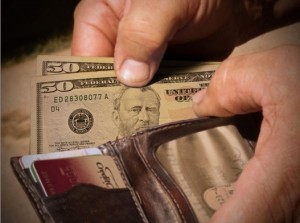 Who is footing the bill for a wedding is generally a hot topic among brides, grooms and their parents.
Who is footing the bill for a wedding is generally a hot topic among brides, grooms and their parents.
While traditionally speaking the bride’s parents are to pay for the wedding, this is generally falling by the wayside as couples pay their own way.
The wedding budget is something that simply must be worked out well before the wedding plans are underway.
In fact, those that are likely to be paying for the wedding, including the parents of the bride and groom, should sit down and have a frank discussion about what their expectations and abilities are.
The budget can be a direct amount or can be broken down line by line.
In either case, the goal is to provide the couple with guidelines to know just how much is expected to be paid by who throughout the course of the wedding.
Once you set the date, set a date to talk money.
It is the most essential thing to do to insure that everyone is on the right track.
Where etiquette is concerned, though, there are some guidelines that should be followed.
Yet, you may be surprised to find that the father of the bride is not the only person that is to be paying for the wedding. In fact, it now includes the groom’s family and the couple themselves!
Decisions, Decisions
One of the first things that should be discussed is the overall style of the wedding.
Do the bride and the groom want a formal, lavish wedding?
If so, to what extreme do they want it to be?
If not, do the bride and groom want an informal wedding?
Again, to what extreme do they want to take this?
Determining the level of hopes that are there is essential to knowing how much will likely be spent.
Also, as much as mom and dad want to, they should not force a style of wedding onto the couple, especially if they will not be footing the entire bill for it.
The Break Down
You can still follow etiquette guidelines especially when the wedding budget is being broken down by those that are in it. Here are some of the things that should be paid for and who should pay for them.
The Bride’s Family
Here are some of the things that the bride’s family should be paying for.
They have by far the most to pay for.
This should come from the parents of the bride or someone else that is sponsoring them.
· The wedding gown, the headpiece and the accessories for the bride to wear
· The bridesmaid’s bouquet
· Corsages for the grandmothers
· Flowers for the reception and the ceremony
· Arches for the altar
· Canopy, carpeting, kneeling benches, candelabras for the wedding ceremony
· All rented items for the wedding ceremony and the reception
· Invitations, announcements and the production of them
· Napkins, wedding programs and other printed items
· The fees for the church including the musician
· The reception hall fees
· Catering for the reception and any other professional services required during the reception
· Wedding photography, videos, and the music at the reception
· The wedding cake and the wedding favors
· Brunch or lunch for the wedding party
The Groom
The groom traditionally pays his own way throughout the wedding.
This may be helped by the groom’s family more commonly today.
· Wedding ring for the bride
· Wedding gift for the bride
· Gifts for the ushers or groomsmen
· The bride’s bouquet
· The mother’s corsages
· Boutonnieres for the groom and the groomsmen
· The marriage license
· The fee for the official doing the wedding
· Limousine services
· Honeymoon arrangements
· All accessories for the groomsmen
The Bride
The bride too is supposed to handle some costs for the wedding.
· The wedding ring for the groom
· The wedding gift for the groom
· Bridesmaids gifts
· Bridesmaids luncheon
The Groom’s Family
They help with the following needs:
· Groom’s cake
· Rehearsal dinner
Other Important Elements
· Bachelor Party is held by the best man
· Bridesmaid’s gowns are paid for by the bridesmaids, including the maid of honor
· The groomsmen’s formal wear is paid for by the groomsmen including the best man and the fathers.
· Formal wear for the children in the wedding is provided by their parents




